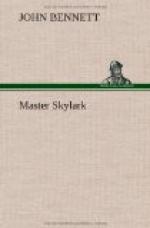Away by the old mill-bridge there were fishermen angling for dace and perch; but when the shout came down from the London road they dropped their poles and ran, through the willows and over the gravel, splashing and thrashing among the rushes and sandy shallows, not to be last when the players came. And old John Carter coming down the Warwick road with a load of hay, laid on the lash until piebald Dobbin snorted in dismay and broke into a lumbering run to reach the old stone bridge in time.
The distant horsemen now were coming on again, riding in double file. They had flung their banners to the breeze, and on the changing wind, with the thumping of horses’ hoofs, came by snatches the sound of a kettledrummer drawing his drumhead tight, and beating as he drew, and the muffled blasts of a trumpeter proving his lips.
Fynes Morrison and Walter Stirley, who had gone to Cowslip lane to meet the march, were running on ahead, and shouting as they ran: “There’s forty men, and sumpter-mules! and, oh, the bravest banners and attire—and the trumpets are a cloth-yard long! Make room for us, make room for us, and let us up!”
A bowshot off, the trumpets blew a blast so high, so clear, so keen, that it seemed a flame of fire in the air, and as the brassy fanfare died away across the roofs of the quiet town, the kettledrums clanged, the cymbals clashed, and all the company began to sing the famous old song of the hunt:
“The hunt is up,
the hunt is up,
Sing merrily we,
the hunt is up!
The
wild birds sing,
The
dun deer fling,
The
forest aisles with music ring!
Tantara,
tantara, tantara!
“Then ride along, ride along,
Stout and strong!
Farewell to grief and care;
With a rollicking cheer
For the high dun deer
And a life in the open air!
Tantara, the hunt is up, lads;
Tantara, the bugles bray!
Tantara, tantara, tantara,
Hio, hark away!”
The first of the riders had reached old Clopton bridge, and the banners strained upon their staves in the freshening river-wind. The trumpeters and the drummers led, their horses prancing, white plumes waving in the breeze, and the April sunlight dancing on the brazen horns and the silver bellies of the kettledrums.
Then came the banners of the company, curling down with a silky swish, and unfurling again with a snap, like a broad-lashed whip. The greatest one was rosy red, and on it was a gallant ship upon a flowing sea, bearing upon its mainsail the arms of my Lord Charles Howard, High Admiral of England. Upon its mate was a giant-bearded man with a fish’s tail, holding a trident in his hand and blowing upon a shell, the Triton of the seas which England ruled; this flag was bright sea-blue. The third was white, and on it was a red wild rose with a golden heart, the common standard of the company.
[Illustration: The lord admiral’s players. “The trumpeters and the drummers led, their horses prancing, white plumes waving in the breeze.”]




